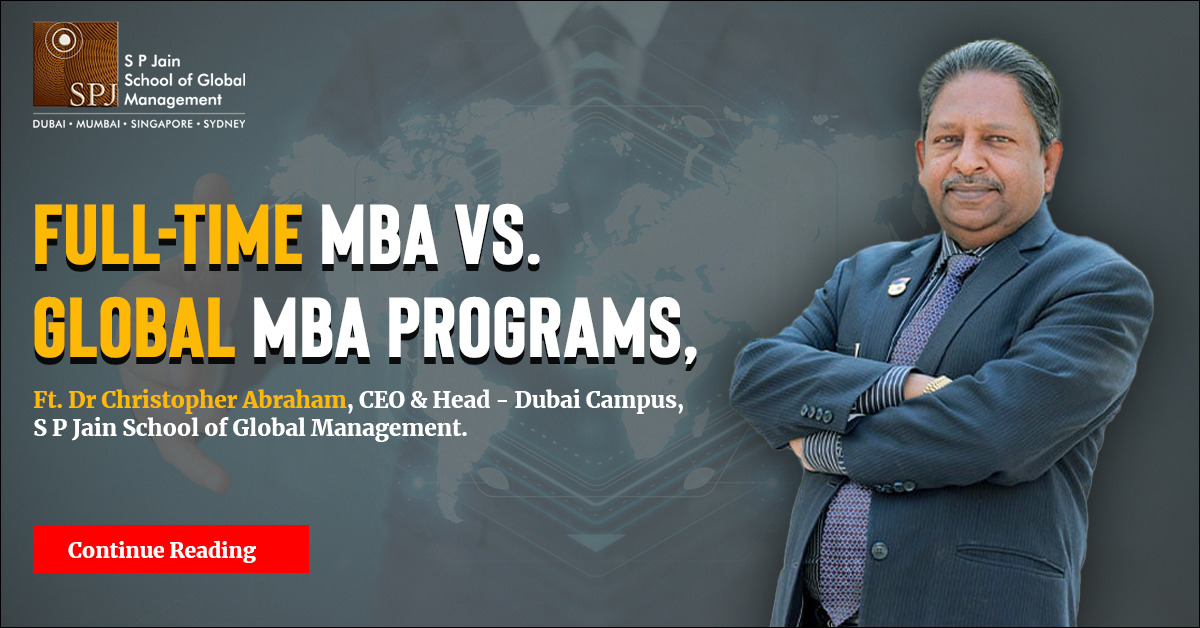
In the ever-evolving landscape of business education, aspiring professionals find themselves torn between the myriad MBA programmes offered worldwide. Among the most debated choices are the Full-Time MBA and Global MBA programmes. With business leaders from both sides touting the merits of their respective curriculums, let’s dive into the distinct differences that set these two apart.
1. Duration and Intensity:
Full-time MBA: Typically spanning two years, these MBA programmes are rigorous and demand complete immersion. However, there could be slack in between the terms as vacation time.
Global MBA: These programmes are usually shorter, ranging from 12 to 18 months. The condensed nature means a brisk pace, and students often take a break from their jobs to pursue this degree, benefiting from intense, on-campus interactions and networking. Good, well-established Global MBA programmes compress the two years of learning into one year without compromising the number of courses and credits.
2. Geographical Exposure:
Full-Time MBA: These programmes, while international or local in content, are usually based in a single location. For instance, a full-time MBA in Mumbai or New York will provide deep insights into Indian or American business practices.
Global MBA: As the name suggests, these programmes emphasise global exposure. Students might find themselves studying in London one semester, Singapore the next, and wrapping up in Dubai or Sydney. This real-world international exposure helps in understanding the nuances of business across cultures. During their time in a particular country, they are exposed to unique cultural nuances, exclusive business practices, and business’s economic and geopolitical implications in that country’s business environment. This diverse exposure also helps students to develop a Global Mindset, preparing them for international careers.
3. Curriculum and Programme Content:
Full-Time MBA: Provides a good understanding of business, from marketing to operations to finance. The focus is on building a strong foundational knowledge of business principles.
Global MBA: While it covers the core modules in a comprehensive manner, there’s a pronounced emphasis on global business strategies, cross-cultural management, and international markets. The case studies, best practices, and simulations from around the world give students unique perspectives. The programme is tailor-made for future global leaders who appreciate the significance of Global Intelligence.
4. Student Projects and Internships:
While Full-time MBA programmes typically offer local projects and internships, Global MBA programmes involve students in real-world international consulting projects, offering practical experience in dealing with global business challenges. In addition, Global MBA programmes also provide international internship opportunities.
5. Student Demographics:
Full-Time MBA: Often combines fresh graduates and professionals with a few years of work experience.
Global MBA: Tends to attract mid-to-senior level professionals with more work experience who are looking to move into global roles or expand their businesses internationally. This participant creates a diverse learning environment, blending academic vigour with real-world insights.
6. Faculty Diversity:
Typical Full-time MBA programmes in a particular location would usually have local faculty teaching the courses.
Global MBA programmes, on the other hand, give students a multi-national perspective as the opportunities to learn from a diverse mix of international professors.
7. Cost Implications:
Full-Time MBA: Given the longer duration, the total cost (including living expenses) can be higher.
Global MBA: While the upfront tuition fees and living expenses might appear steeper, the shorter duration and potential for higher earnings after the programme can offset the overall costs. Many institutions offer scholarships and financial aid to mitigate these costs for deserving students.
8. Post-Programme Opportunities:
Full-Time MBA: Graduates typically have opportunities in a variety of sectors and roles, ranging from startups to bigger companies. However, most placements are local or national.
Global MBA: Graduates are well-poised for roles that demand a global perspective, be it in multi-national corporations, international NGOs, or global strategy roles. They benefit from on-campus recruitment and strong alumni networks across the globe.
For more insights on How global MBA is helping young professionals ace the career game, watch this video by Rodrigo Ramos (MGB Intake of 2021)
Conclusion: While both Full-Time and Global MBA programmes from good and reputed institutions offer a robust business education, the right choice hinges on individual career aspirations, experience levels, and personal commitments.
Aspiring candidates should consider their long-term goals, how they value global exposure, and their readiness for immersion to make an informed decision. As with any significant life choice, due diligence and introspection are key.
